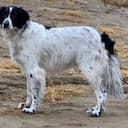Origins and Temperament
The majestic Irish Wolfhound boasts a lineage that dates back to antiquity, originally bred for the purpose of hunting and guarding. With their calm and dignified temperament, these dogs are known as gentle giants, displaying both patience and intelligence. These characteristics make them amiable travel companions, though their sensitive nature means they can sometimes be prone to travel anxiety, requiring handlers who are attuned to their emotional needs during transportation.
Size and Physical Needs
As one of the tallest breeds, Irish Wolfhounds can stand nearly three feet at the shoulder and weigh up to 180 pounds. These dimensions necessitate spacious travel accommodations to ensure comfort. While not overly active, they require regular exercise to maintain their health; during travel, spacious areas to stretch their legs are essential. Tailored travel arrangements that cater to these needs are vital in preventing undue stress and discomfort.
Common Health Considerations
Irish Wolfhounds are susceptible to conditions like heart disease, bloat, and bone cancer. Prior to travel, ensure that all health documents are updated and accessible, and take precautions to mitigate health risks. Discussions with your veterinarian about travel preparedness for your Wolfhound can prove invaluable for a safe and comfortable journey.
















